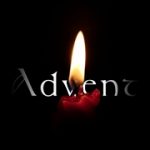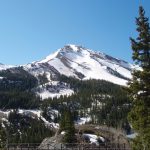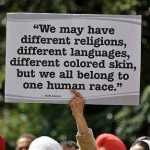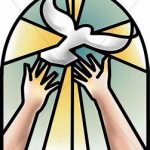 Today’s Second Reading tells us that the “peace of God . . . will guard [our] hearts and minds in Christ Jesus.” Guarding? Isn’t that for soldiers and police? But peace guarding our hearts? In another place in Scripture we read that Christ is our peace (Micah 5:4 and Eph. 2:14). Yes, Christ guards our hearts, for Christ is the source (Chardin speaks of “field”) of love into which all are attracted. His Spirit is the power of love.
Today’s Second Reading tells us that the “peace of God . . . will guard [our] hearts and minds in Christ Jesus.” Guarding? Isn’t that for soldiers and police? But peace guarding our hearts? In another place in Scripture we read that Christ is our peace (Micah 5:4 and Eph. 2:14). Yes, Christ guards our hearts, for Christ is the source (Chardin speaks of “field”) of love into which all are attracted. His Spirit is the power of love.
With less than a countdown of days until Christmas, peace may be far from us, replaced by worry and agitation and frenzy. Christ with his peace will come to us when we respond with the gift of our lives. Give God today your Christmas to-do list. Make it your Christmas wish list. Jesus, please help me check off the last-minute buying and wrapping and baking. If we let Christ in, He will guard our hearts with peace. Then we will have made our list and checked it twice—once for “I got it done!” and once for “Thanks, Jesus, you let me do it in peace.”
 There’s a prayer tucked into today’s Second Reading at Mass for this Second Sunday of Advent: “And this is my prayer, that your love may overflow more and more with knowledge and insight.” We all know persons who are difficult to love. They live in our own houses, among our coworkers, in our communities. We try to suppress our feelings of annoyance, we fake our pleasantries, and we feel guilty. Maybe Saint Paul’s advice will help: Gain some knowledge and insight about the person. When we uncover their past or ask about their families we understand them a little more. When we go out of our way to share a cup of coffee or spend a few minutes in conversation, we begin to realize the person’s cares and concerns, motives, hardships and successes. We gain insight and perhaps in the process grow in love. May our Advent valleys be filled to overflowing with love.
There’s a prayer tucked into today’s Second Reading at Mass for this Second Sunday of Advent: “And this is my prayer, that your love may overflow more and more with knowledge and insight.” We all know persons who are difficult to love. They live in our own houses, among our coworkers, in our communities. We try to suppress our feelings of annoyance, we fake our pleasantries, and we feel guilty. Maybe Saint Paul’s advice will help: Gain some knowledge and insight about the person. When we uncover their past or ask about their families we understand them a little more. When we go out of our way to share a cup of coffee or spend a few minutes in conversation, we begin to realize the person’s cares and concerns, motives, hardships and successes. We gain insight and perhaps in the process grow in love. May our Advent valleys be filled to overflowing with love.
 Let’s make Advent an Advent-ure by becoming more aware of God’s coming. One way is to consider the three M’s of Advent. The first M stands for Memory. In the four weeks of Advent we pull out the Church’s scrapbook and look at the many persons and events leading up to the coming of the Messiah: Isaiah, David, John the Baptist, Joseph, and Mary, among others.
Let’s make Advent an Advent-ure by becoming more aware of God’s coming. One way is to consider the three M’s of Advent. The first M stands for Memory. In the four weeks of Advent we pull out the Church’s scrapbook and look at the many persons and events leading up to the coming of the Messiah: Isaiah, David, John the Baptist, Joseph, and Mary, among others.
The second M represents Majesty. Did you wake up this morning thinking “Today might be the end of the world”? Probably not, but the Church wisely gives us four weeks to know that the Second Coming cometh. Whether tomorrow or hundreds of millennia from now, the Second Coming completes the first one. At that time the Incarnation will reach its fullness when all creation will be united in Jesus Christ.
The third M stands for Mystery. God comes every moment into our lives in mystery. How has God come mysteriously to you this week? In beautiful scenery? lyrics of a song? the innocence of a child? Forgiveness? Scripture? Prayer? kind words? So many persons and events bring God to us. AND what we need to remember is that God uses us to reveal His mysterious presence through our words and deeds.
So now you know the 3 M’s of Advent. M-M-M! Sounds like something good to eat. That’s what Advent is all about—sharing God’ goodness.
 “May the Lord make you increase and abound in love” is the prayer of today’s Second Reading. What does boundless love look like? Do you see a small child running to a grandparent to encircle legs in a hug? Or an adult son or daughter caring day after day for an elderly parent shriveled with dementia and arthritis? Is it a parent working three jobs so the children receive a good education? Is it the priest ministering at two parishes? Is it yourself?
“May the Lord make you increase and abound in love” is the prayer of today’s Second Reading. What does boundless love look like? Do you see a small child running to a grandparent to encircle legs in a hug? Or an adult son or daughter caring day after day for an elderly parent shriveled with dementia and arthritis? Is it a parent working three jobs so the children receive a good education? Is it the priest ministering at two parishes? Is it yourself?
Advent is the season for boundless love. As you count the days until Christmas and wonder “How will I ever get it all done?” pray that each thing you do demonstrates boundless love. Throw a cupful of boundless love into the cookie dough. Smile at the cashier, inwardly extending boundless love. Clean your house remembering the boundless love that each room holds. Seal each Christmas card with a prayer that the Lord will make the recipients “increase and abound in love.” And in all the busyness of the month you’ll find yourself abounding in love on Christmas morning.
On this feast of Saint Andrew we hear Jesus inviting him, “Come after me, and I will make you fishers of men.” If we are fishers of people, what is our bait and hook? What do we do and say to attract persons to Christ? I feel the answer is simply bearing the mystery of Christ within and letting it show through our lives. We need to complete and perfect ourselves—to be the best version of ourselves as Matthew Kelly states.
 As a kid, I liked to climb a mountain of snow and yell “I’m king!” But when no one was around to hear my yell, was I really a king? What makes Jesus a king? We do. After all, you can’t be a king if you don’t have followers. We just celebrated the solemnity of Our Lord Jesus Christ, King of the Universe. The title is a paradox. While Jesus Christ is ruler over the cosmos, the Gospel presented him during his passion. The cross is his throne, and his crown is made of thorns. No trappings of triumphalism there! Typical hymns for the solemnity underscore the paradox. “Crown Him with Many Crowns” hails Jesus with his scepter. But we also sing “Lift High the Cross,” remembering we are his followers who bear on “our brow the seal of him who died.” The verses of these two hymns alternate between Good Friday and the Second Coming, while rooting us in today’s reality that we are followers carrying our crosses and awaiting our crowns.
As a kid, I liked to climb a mountain of snow and yell “I’m king!” But when no one was around to hear my yell, was I really a king? What makes Jesus a king? We do. After all, you can’t be a king if you don’t have followers. We just celebrated the solemnity of Our Lord Jesus Christ, King of the Universe. The title is a paradox. While Jesus Christ is ruler over the cosmos, the Gospel presented him during his passion. The cross is his throne, and his crown is made of thorns. No trappings of triumphalism there! Typical hymns for the solemnity underscore the paradox. “Crown Him with Many Crowns” hails Jesus with his scepter. But we also sing “Lift High the Cross,” remembering we are his followers who bear on “our brow the seal of him who died.” The verses of these two hymns alternate between Good Friday and the Second Coming, while rooting us in today’s reality that we are followers carrying our crosses and awaiting our crowns.
Think of the title “king” as one of governance, and we see Jesus as one responsible for the care and well-being of God’s People. We who have been baptized as “priest, prophet, and king” must attend to the care and well-being of others, too. We have been given one another as neighbor and kin and good stewards of the earth. We build Christ’s kingdom on earth. One day we’ll all be part of the new heaven and new earth. Then we’ll realize that God’s kingdom is more like a “kin-dom.” One day all humanity will be a family made in the image of God and we’ll see each other as brothers and sisters in Christ. In the meantime, let’s treat each other royally.
In 1776 we took a big chance and won our independence. Not long after we took another big risk. We wrote a Constitution assuring every citizen freedom and rights the world had never seen. In the 1880s and early 1900s our nation abolished slavery and gave everyone the right to vote. In the first half of this past century we took a chance on making the world safe for democracy, and we won. Now in 2018 we face another big chance—the chance to do the right, continue our greatness, and live up to our values.
A caravan from Central America, 2300 of whom are children, are laboriously traipsing hundreds of miles with hope in their hearts but little on their backs. Meanwhile border patrol agents in riot gear are undergoing exercise drills to do what? Scare kids? Don’t let prejudice and fear take the place of American v alues. If we love our country, we’ll let in the migrants and refugees. Their presence will improve our economy by creating jobs, as well as taking the jobs no one else wants. And these migrants will work with enthusiasm, pride, gratitude, and expertise. We need these migrants as medical personnel, teachers, and persons in service areas.
alues. If we love our country, we’ll let in the migrants and refugees. Their presence will improve our economy by creating jobs, as well as taking the jobs no one else wants. And these migrants will work with enthusiasm, pride, gratitude, and expertise. We need these migrants as medical personnel, teachers, and persons in service areas.
Migrants and refugees are not a problem; they are our chance to do what we’ve done for over two centuries. We the people of the United States are the most generous people on the globe. How did that happen? Because once upon a time, except for Native Americans, everyone was an immigrant. Everyone was grateful to be a citizen, where freedom and justice were new phenomena, where everyone could dream the same American dream. And we prospered. We the People of the United States once again have a chance to form a more perfect union by welcoming the refugee. Let’s not miss our chance.
 Are our national policies based on the WIIFM principle—What’s in it for me? Maturity is determined by how much we grow out of self-centeredness and how far we can attend to the other. Though the most powerful nation on earth, we are childish in practice. Does it always have to be “my way”? To the rest of the world do we sound like spoiled children never sharing our toys? Just a few examples:
Are our national policies based on the WIIFM principle—What’s in it for me? Maturity is determined by how much we grow out of self-centeredness and how far we can attend to the other. Though the most powerful nation on earth, we are childish in practice. Does it always have to be “my way”? To the rest of the world do we sound like spoiled children never sharing our toys? Just a few examples:
Nearly 700 million people lack safe drinking water causing 800 children to die every day. Drilling a well costs under $5000 and will give a thousand people clean water for the rest of their and the lives of their progeny. With all the money spent on sending troops to the border—for what purpose?—we could make friends around the globe with just buckets of clean water.
The Intergovernmental Panel on Climate Change predicts environmental catastrophe by 2040. We could afford sustainable energy if we weren’t wasting talent and resources on nuclear weapons that sit in storage and campaign ads that say nothing.
We protect ourselves from potential attack and imagined enemies while ignoring Syrian Christians who escaped from ISIS in 2014 only to spend the last four years without hope in camps.
How many meals could an assault rifle buy? How many diseases could be eradicated with the cost of refurbishing an old warhead? How many young lives could be rehabilitated for the cost of incarceration?
What our nation fails to realize that what’s in it for me is the opportunity to assure our citizens and the citizens of the globe the “life, liberty, and the pursuit of happiness” that we profess. Let’s grow up.
 I recently watched the video made by Bo Landin titled “Toxic Puzzle.” Toxins are everywhere: in the air, in water, in the ground. The movie showed that toxins are causing ALS, Parkinson’s disease, dementia, and other neurological disorders. The culprit is BMAA, which is present in every algae bloom. Only very specialized equipment can detect BMAA, so rarely is it tested or talked about. Many don’t believe in cyanobacteria, but tests have proven its presence. Tests on beached dolphins, for example, show they had the equivalent of Alzheimer’s with BMAA in their cells, which corrupt body-building proteins. Bo Landin predicts that 50% of the population will have Alzheimer’s. Meanwhile, our nation backs out of global environmental efforts.
I recently watched the video made by Bo Landin titled “Toxic Puzzle.” Toxins are everywhere: in the air, in water, in the ground. The movie showed that toxins are causing ALS, Parkinson’s disease, dementia, and other neurological disorders. The culprit is BMAA, which is present in every algae bloom. Only very specialized equipment can detect BMAA, so rarely is it tested or talked about. Many don’t believe in cyanobacteria, but tests have proven its presence. Tests on beached dolphins, for example, show they had the equivalent of Alzheimer’s with BMAA in their cells, which corrupt body-building proteins. Bo Landin predicts that 50% of the population will have Alzheimer’s. Meanwhile, our nation backs out of global environmental efforts.
Isn’t this social sin?
 Baptism is replete with symbols: candle, water, oil of catechumens, chrism, new name. But the one that speaks most to me is the white garment. Although white may symbolize purity of soul, the adjective “white” is less significant that the noun “garment.” For we are clothed with Christ. We put on, coat-like, a new person, a new member of Christ’s Body and Church. Teilhard de Chardin uses similar imagery. At the Omega Point Christ will wrap himself with the garment of humanity. Jesus, the Christos, will not only be clothed in his humanity but in all humanity. May we enwrap Christ in glory.
Baptism is replete with symbols: candle, water, oil of catechumens, chrism, new name. But the one that speaks most to me is the white garment. Although white may symbolize purity of soul, the adjective “white” is less significant that the noun “garment.” For we are clothed with Christ. We put on, coat-like, a new person, a new member of Christ’s Body and Church. Teilhard de Chardin uses similar imagery. At the Omega Point Christ will wrap himself with the garment of humanity. Jesus, the Christos, will not only be clothed in his humanity but in all humanity. May we enwrap Christ in glory.


